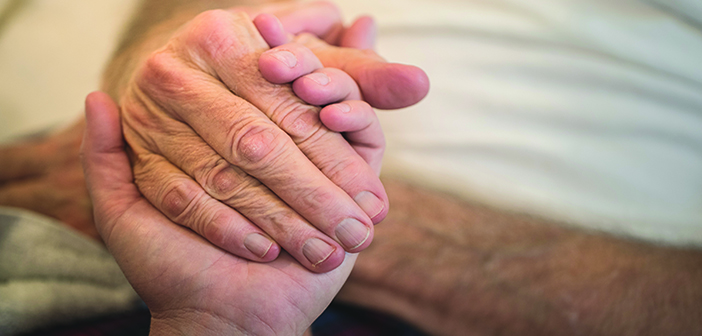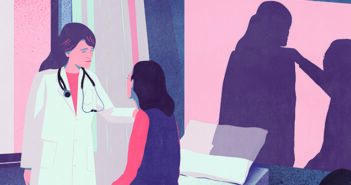Chaplains and palliative care doctors share the power to ease suffering.
As a palliative care doctor, I often feel misunderstood. Though it’s early in my training, I have already been called “Doctor Death” and heard doctors and nurses say over and over about patients in ill and failing health that “it’s not time for palliative care yet.”
It turns out that many of the people I encounter— patients and health care providers alike—have only a limited idea of what I do and, more importantly, the ways that I can help patients. They often assume that my role begins only when a patient is nearing death. But while palliative care does include hospice,
in reality it is so much more.
Palliative care has all of the comprehensive, compassionate aspects of hospice care—expert pain management, spiritual and emotional support, attention to the aspects of life that are most important to the patient—but none of the restrictions. There is no need to forego cure-directed therapies in order to receive palliative care. There’s no requirement that a patient have a terminal illness with a limited life expectancy. All other care can proceed as it did previously, with palliative care providing an additional layer of support to patients and families. But when I enter a room and patients see “Hospice and Palliative Medicine” on my ID badge, they often balk and shut down before we’ve even begun speaking. The help that I can offer is blunted by patients’ wariness and other doctors’ reticence to consult my team.
So I try, whenever possible, to educate anyone I encounter—students, trainees, attending physicians, nurses, social workers, families—about what the palliative care team can offer. But as a hospice and palliative medicine fellow, I still have a lot to learn. In fact, I continually discover just how much I have yet to know.
Care for the Soul
Earlier this year, I spent an elective month with the team of multifaith chaplains at Rhode Island Hospital. My goal was to deepen my exposure to the core beliefs and traditions of various faiths in order to better serve patients and families during times of grave illness and at the end of life. With only a few years of tepid Lutheran practice in childhood and assorted anecdotes about different faiths garnered from friends with varying levels of devotion, I often feel illequipped to address my patients’ spiritual needs. What I learned, though, was that the questions I set out to address weren’t even the ones I should be asking.
It turns out that chaplains, too, are misunderstood and underutilized. Their introductions are at times met with a polite but firm, “No thanks, I’m all set,” as patients decline what they assume will be an offer of prayer or a conversation centered around religion. Patients and providers alike often equate the chaplains’ very presence with bad news or impending decline.
But chaplains, in fact, offer support, companionship, an open ear. They meet patients where they are in the moment and respond to whatever spiritual distress they are experiencing, be it the toll of a diagnosis, a loss of purpose, a crisis of faith. Shock and grief are certainly emotions they address frequently. But so, too, are humor, compassion, and love.
On my first day rounding with a chaplain, we visited a woman who had had multiple hospitalizations. We talked about the time she had spent with her family since her last admission, symptoms that had been particularly troubling, and how much of her illness she and her husband had shared with their small children. As tears streamed down the patient’s cheeks, the chaplain noted gently that these in no way indicated a loss of the strength that she fought so hard to maintain. The chaplain had been a consistent presence throughout the patient’s ordeal. There had been little talk of faith and infrequent prayers, but so much care delivered.
Later we met a woman who had been hospitalized for more than a month. Within the first minute of our interaction, when asked what carried her through the hard times, the woman responded candidly: “My faith in God. Without that, I would never have made it this far.” The chaplain explored the woman’s faith, her image of God, and how these had been influenced by her family and upbringing. Her questions unearthed grief for a lost sibling and strain in the patient’s relationship with a surviving relative. The woman requested a prayer, and when we left she was visibly more relaxed than when we had arrived.
Despite her prolonged hospitalization and the integral role of religion in her life, this woman had never had a visit from a chaplain. Perhaps this was because her condition and course up to this point had been too severe and complex for her team to turn their attention away from test results and treatment plans. She did ultimately receive spiritual care, though only because we had been consulted for another patient on the floor and asked the team if any other patients might also benefit from such support.
Although this patient was devout and wanted the chaplain to pray with her, there are many others who do not follow any religion who could benefit. As a result, when we as the health care team either fail to offer spiritual support or are unaware that the scope of such care encompasses far more than the teachings or practices of a particular faith, we fail to provide our patients with the full range of interdisciplinary care that our institution can provide.
In the multifaith chaplains I found a team so much like my own: a group of people eager and well-equipped to provide care, who can ease the illness experience of many patients and families, but who are often overlooked and misunderstood. I was also chastened to recognize my own lack of knowledge. If I, as a physician who often deals with bad news and impending decline, was unfamiliar with the depth and range of spiritual care available, certainly it was unfair to expect any different from anyone else.
We can all do better for our patients. But in order to broaden the horizons of the care we deliver, we must first broaden our own.




